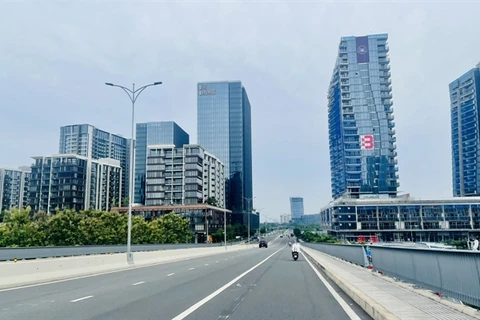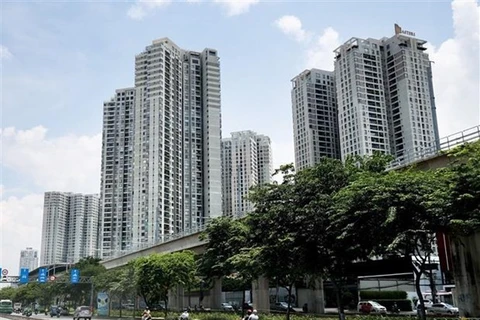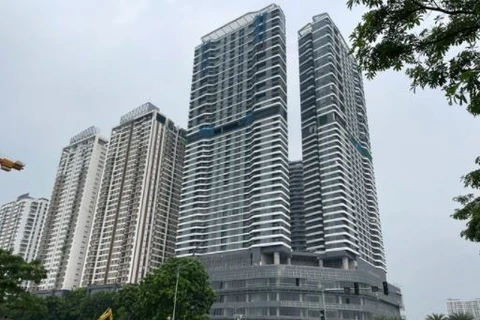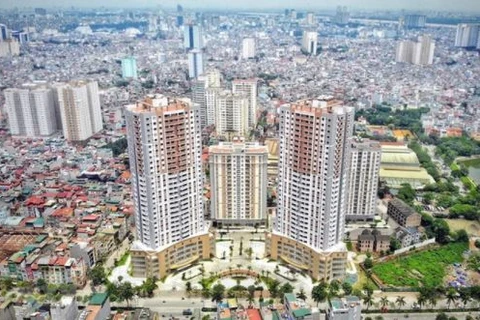HCM City (VNS/VNA) - Foreign investors are expected to plough large amounts of money into the Vietnamese property market in 2024-26.
Market research company Cushman & Wakefield said recently “Many transactions are in the negotiation process with a positive outlook. The expected investment goals still lie in finding clean, good-quality land funds with real value, as well as having legal ownership rights… and development potential.”
While there are still challenges, Cushman & Wakefield believe this is the right time for businesses to step up activities, especially those with deep pockets.
It attributed the optimistic forecast to falling bank interest rates and the passage of many new decrees that remove obstacles faced by the property sector.
Besides, the Government is implementing many other solutions to improve the quality of real estate projects, transparency, rule of law, and the business environment in general.
The property market, notably in Ho Chi Minh City and Hanoi, has developed rapidly since the Law on Real Estate took effect in 2003.
Since then, M&A activities have also increased significantly in both number and value, according to Cushman & Wakefield.
But data from RCA and Cushman & Wakefield shows a slump in 2023, with the figure for the first nine months falling by 33% year-on-year to 729 million USD due to the lack of high-value deals.
Asian investors from Singapore, Malaysia, Taiwan (China), and the Republic of Korea (RoK) have led the way with advantages like geographical location, cultural similarities and understanding of local laws.
Overall, 2023 transaction data shows that foreign investors still account for most property transactions, purchases and investment activities, with the domestic sector accounting for less than 10% of transactions.
The company attributed the downturn to the fact that domestic businesses are still facing many unfavourable factors, such as the generally tricky situation of the economy, unresolved project legalities, corporate bond problems, and lack of access to capital.
“As the global economy is going through uncertainty, an emerging country like Vietnam has become quite a promising investment market,” said Trang Bui, country head of Cushman & Wakefield Vietnam.
The attractive rate of return in Vietnam is an essential factor in the investment decisions made by foreign investors, Cushman & Wakefield said.
Since 2018, Vietnam has seen a total of 4.2 billion USD in property investment, of which housing and industrial assets accounted for 46% and 28%, according to RCA and Cushman & Wakefield data.
This shows foreign investors remain focused on traditional assets, mainly serving the needs of actual end users.
The high-end housing market remains the top choice of foreign investors. With increasing disposable income and rapid urbanisation, especially in Hanoi and HCM City, Vietnam has expanded its appeal to investors who want to target the housing sector.
Until 15 years ago, FDI flows were concentrated in the high-end housing segment.
Well-known names in the market, such as Keppel Land and Capitaland, were among the first to offer high-end real estate projects, such as The Estella and The Vista.
The total supply of luxury apartments in HCM City then was around 1,700 units, of which about 1,000 were by foreign developers.
The market has since started seeing more foreign investors like Hong Kong Land, Frasers Property, Mapletree, Daiwa House, Nomura, Sumitomo, Lotte Group and GS.
This has increased the number of luxury apartments developed by foreign investors to 23,800 units as of Q3 2023.
Since 2018, the industrial and logistics real estate segment has outperformed most others thanks to growth in manufacturing, exports, e-commerce, transportation, and warehousing.
The manufacturing sector accounts for the majority of FDI as many businesses are interested in Vietnam as a new destination for expansion in Southeast Asia.
Foreign funds continue to look for investment opportunities in the form of well-located office real estate in Vietnam, especially in HCM City.
In the last five years, rentals in office buildings have improved, especially grade A.
Since 2022, the market has been seeing some transactions, notably with the sale of hotels Ibis Saigon South and Capri by Fraser in HCM City.
In 2023, there was a significant transaction in the retail sector worth $52 million by Singapore's Keppel Land Group./.
Market research company Cushman & Wakefield said recently “Many transactions are in the negotiation process with a positive outlook. The expected investment goals still lie in finding clean, good-quality land funds with real value, as well as having legal ownership rights… and development potential.”
While there are still challenges, Cushman & Wakefield believe this is the right time for businesses to step up activities, especially those with deep pockets.
It attributed the optimistic forecast to falling bank interest rates and the passage of many new decrees that remove obstacles faced by the property sector.
Besides, the Government is implementing many other solutions to improve the quality of real estate projects, transparency, rule of law, and the business environment in general.
The property market, notably in Ho Chi Minh City and Hanoi, has developed rapidly since the Law on Real Estate took effect in 2003.
Since then, M&A activities have also increased significantly in both number and value, according to Cushman & Wakefield.
But data from RCA and Cushman & Wakefield shows a slump in 2023, with the figure for the first nine months falling by 33% year-on-year to 729 million USD due to the lack of high-value deals.
Asian investors from Singapore, Malaysia, Taiwan (China), and the Republic of Korea (RoK) have led the way with advantages like geographical location, cultural similarities and understanding of local laws.
Overall, 2023 transaction data shows that foreign investors still account for most property transactions, purchases and investment activities, with the domestic sector accounting for less than 10% of transactions.
The company attributed the downturn to the fact that domestic businesses are still facing many unfavourable factors, such as the generally tricky situation of the economy, unresolved project legalities, corporate bond problems, and lack of access to capital.
“As the global economy is going through uncertainty, an emerging country like Vietnam has become quite a promising investment market,” said Trang Bui, country head of Cushman & Wakefield Vietnam.
The attractive rate of return in Vietnam is an essential factor in the investment decisions made by foreign investors, Cushman & Wakefield said.
Since 2018, Vietnam has seen a total of 4.2 billion USD in property investment, of which housing and industrial assets accounted for 46% and 28%, according to RCA and Cushman & Wakefield data.
This shows foreign investors remain focused on traditional assets, mainly serving the needs of actual end users.
The high-end housing market remains the top choice of foreign investors. With increasing disposable income and rapid urbanisation, especially in Hanoi and HCM City, Vietnam has expanded its appeal to investors who want to target the housing sector.
Until 15 years ago, FDI flows were concentrated in the high-end housing segment.
Well-known names in the market, such as Keppel Land and Capitaland, were among the first to offer high-end real estate projects, such as The Estella and The Vista.
The total supply of luxury apartments in HCM City then was around 1,700 units, of which about 1,000 were by foreign developers.
The market has since started seeing more foreign investors like Hong Kong Land, Frasers Property, Mapletree, Daiwa House, Nomura, Sumitomo, Lotte Group and GS.
This has increased the number of luxury apartments developed by foreign investors to 23,800 units as of Q3 2023.
Since 2018, the industrial and logistics real estate segment has outperformed most others thanks to growth in manufacturing, exports, e-commerce, transportation, and warehousing.
The manufacturing sector accounts for the majority of FDI as many businesses are interested in Vietnam as a new destination for expansion in Southeast Asia.
Foreign funds continue to look for investment opportunities in the form of well-located office real estate in Vietnam, especially in HCM City.
In the last five years, rentals in office buildings have improved, especially grade A.
Since 2022, the market has been seeing some transactions, notably with the sale of hotels Ibis Saigon South and Capri by Fraser in HCM City.
In 2023, there was a significant transaction in the retail sector worth $52 million by Singapore's Keppel Land Group./.
VNA

























